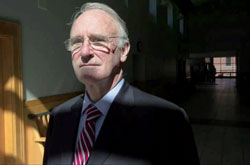Foreclosure attorney wins prize for uncovering 'robosigning'

Photo of Thomas Cox by Associated Press
Thomas Cox’s career has traveled an arc of poetic justice, from writing a how-to foreclosure training manual to exposing industrywide mortgage fraud two decades later. Now his hard work on behalf of embattled homeowners has earned him a Purpose Prize, the country’s only large-scale award for creative problem-solvers age 60 and older.
But at 68, Cox isn’t resting on his laurels or heading into retirement. He is working harder than ever and plans to use the $100,000 award to build a network of retired lawyers to do similar pro bono work.
“I’m hoping someone can look back in a number of years and say it really did change the way [mortgage companies] worked,” says Cox of Portland, Maine.
Cox hasn’t always been so satisfied by his work. He left the law in 1999 “to get some semblance of peace” after his career took a negative turn. In the 1980s, he had a successful law practice representing banks in litigation cases and business deals, until the savings and loan crisis hit. Cox says that his practice turned into one of debt collections and foreclosures almost overnight, and he began to spiral downward.
Seeking a change, Cox turned to carpentry—a trade he knew—and began building homes, rather than taking them away. It was restorative. Nine years later, Cox felt a pull back toward the law. In 2008, he decided to volunteer at Pine Tree Legal Assistance and helped the organization launch its Maine Attorneys Saving Homes initiative.
As Cox reviewed foreclosures that came in, he noticed troubling patterns. Cox spent his own money to hire a private investigator and to travel to depose a GMAC Mortgage officer who had signed thousands of lending documents. What he uncovered set in motion a chain of events that helped change mortgage practices across the country.
“The deposition was astounding,” Cox recalls. “Very few lawyers get that kind of moment. I remember sitting down outside and saying to myself, ‘My gosh, look what I just got.’ ”
What Cox “got” was an admission of “robosigning” thousands of affidavits that should have required personal knowledge, exposing systemic fraud by mortgage loan servicers.
“I think it became pivotal,” says Nina Simon, a Washington, D.C., lawyer who worked with Cox on several cases in her role as director of litigation at the Center for Responsible Lending. “Certainly, using that deposition and making it available to people really highlighted the issue” of robosigning.
Homeowners facing foreclosure across the country have benefited from Cox’s tenacity. Last February, 49 states and the federal government reached a $25 billion settlement agreement with the five biggest mortgage servicers. Cox now speaks to law students and pro bono groups to expand the pool of attorneys handling foreclosure cases, when he is not busy juggling his own caseload at MASH.
The Purpose Prize is awarded by Encore.org, a nonprofit that develops programs aimed at encouraging retired and older workers to take on second careers in community service.



